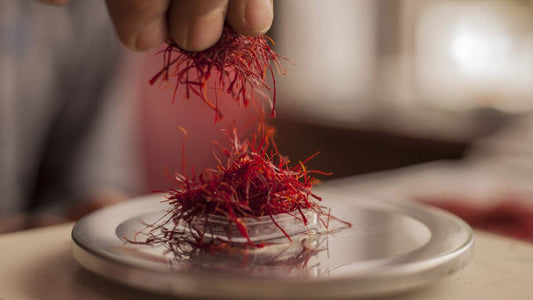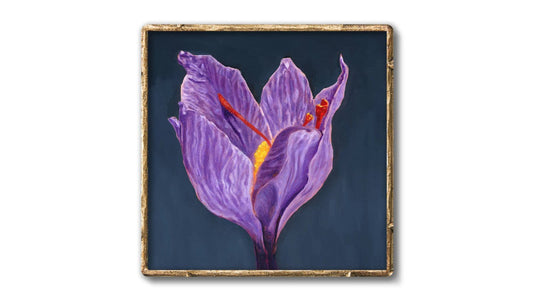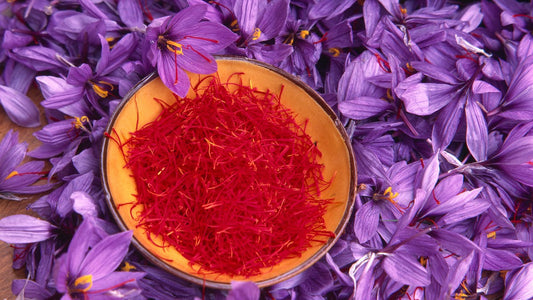
Saffron for Depression: A Natural Remedy Backed by Science
Ara OhanianShare
Depression is one of the most common mental health challenges worldwide, affecting millions of people every year. While conventional treatments like therapy and medication are effective for many, there’s growing interest in natural remedies that can complement these approaches. One such remedy is saffron, often referred to as the "golden spice." Emerging research suggests that saffron may provide significant benefits for those dealing with depression.
In this blog, we’ll dive deep into how saffron can help combat depression, what the science says, and how you can incorporate it into your daily routine.
What is Saffron?
Saffron is a bright red spice derived from the stigmas of the Crocus sativus flower. It has been prized for centuries for its rich flavor, vibrant color, and medicinal properties. Native to regions like Iran, India, and parts of Europe, saffron is one of the most expensive spices in the world due to the labor-intensive process of harvesting it by hand.
While saffron is best known as a culinary spice, it’s also been used in traditional medicine for its antioxidant, anti-inflammatory, and mood-enhancing properties. Recent scientific studies have begun to validate these traditional uses, particularly in the context of mental health and depression.
How Does Saffron Help with Depression?
Saffron’s potential benefits for depression largely stem from its chemical composition. The spice contains active compounds like crocin, crocetin, safranal, and kaempferol, which are known to have neuroprotective and mood-regulating effects.
Here’s how these compounds may help alleviate depression:
- Boosts Serotonin Levels: Saffron may increase the availability of serotonin, a neurotransmitter often referred to as the "feel-good hormone." Low serotonin levels are commonly linked with depression.
- Antioxidant Properties: The compounds in saffron help reduce oxidative stress and inflammation in the brain, which are thought to play a role in depressive symptoms.
- Improves Neurotransmitter Function: Saffron enhances the function of key neurotransmitters that regulate mood and emotions.
- Reduces Cortisol Levels: Chronic stress and high cortisol levels are associated with depression. Saffron may help lower cortisol, promoting a sense of calm and well-being.
Scientific Evidence Supporting Saffron for Depression
Over the past decade, researchers have conducted numerous studies to explore the role of saffron in managing depression. Here are some key findings:
- A 2013 Meta-Analysis: Researchers reviewed multiple clinical trials and found that saffron was as effective as standard antidepressant medications like fluoxetine (Prozac) in reducing symptoms of mild to moderate depression.
- A 2016 Study: A double-blind, placebo-controlled study demonstrated that participants who took saffron supplements for 12 weeks showed significant improvement in their depression scores compared to those who took a placebo.
- Effectiveness in Adolescents: In 2017, a study focused on adolescents found that saffron supplementation reduced both depressive and anxiety symptoms, suggesting its potential for younger populations.
While these findings are promising, it’s important to note that saffron is not a replacement for professional treatment. Always consult a healthcare provider before making changes to your mental health care plan.
How to Use Saffron for Depression
Incorporating saffron into your daily routine can be simple and enjoyable. Here are some practical ways to use it:
- Saffron Tea: Steep a few threads of saffron in hot water for 10-15 minutes. Add honey or lemon for flavor.
- Golden Milk: Mix saffron with warm milk, turmeric, and a sweetener of your choice for a soothing drink.
- Cooking: Add a pinch of saffron to rice, soups, or stews for both flavor and health benefits.
- Saffron Supplements: Standardized saffron extracts are available in capsule or tablet form. These are particularly useful for those who want a precise dosage.
For best results, aim for a daily dose of 30-50 mg of saffron, as this is the range most commonly used in research studies. Avoid exceeding recommended amounts, as excessive saffron consumption may lead to side effects like dizziness or nausea.
Are There Side Effects of Using Saffron?
Saffron is generally considered safe when consumed in moderate amounts. However, some people may experience mild side effects such as:
- Dizziness
- Dry mouth
- Upset stomach
- Allergic reactions (rare)
Pregnant women should exercise caution, as high doses of saffron may stimulate uterine contractions. Always consult your doctor before using saffron, especially if you are pregnant, breastfeeding, or taking medications.
Where to Buy High-Quality Saffron
To experience the full benefits of saffron for depression, it’s essential to choose a high-quality product. Low-grade or adulterated saffron may lack the potency needed for therapeutic effects. At PureSaffron, we offer premium, pure Persian saffron that is lab-tested for authenticity and quality.
Check out our Persian Pure Saffron for a reliable source of this golden spice.
FAQs About Saffron for Depression
-
1. How long does it take for saffron to work for depression?
Most studies suggest that noticeable improvements in mood occur within 6-12 weeks of regular saffron use. -
2. Can saffron replace antidepressants?
No. While saffron has mood-enhancing properties, it should not replace prescribed medications without consulting a healthcare provider. -
3. Is saffron safe for children with depression?
Some studies suggest saffron may benefit adolescents, but always consult a pediatrician before use. -
4. What is the best way to take saffron for depression?
Both saffron tea and standardized supplements are effective. Choose the method that fits your lifestyle. -
5. Are there any drug interactions with saffron?
Saffron may interact with certain medications, including blood thinners and antidepressants. Consult your doctor before use.
In conclusion, saffron offers a promising natural remedy for depression, backed by both tradition and modern science. By incorporating this golden spice into your wellness routine, you may experience improved mood and overall mental well-being. However, always consult a healthcare professional for personalized advice.




